Oct 15, 2025. Weekly Dharma Assembly
Hello. Today is the day of the Weekly Dharma Assembly, where Jungto Society members examine their practice.
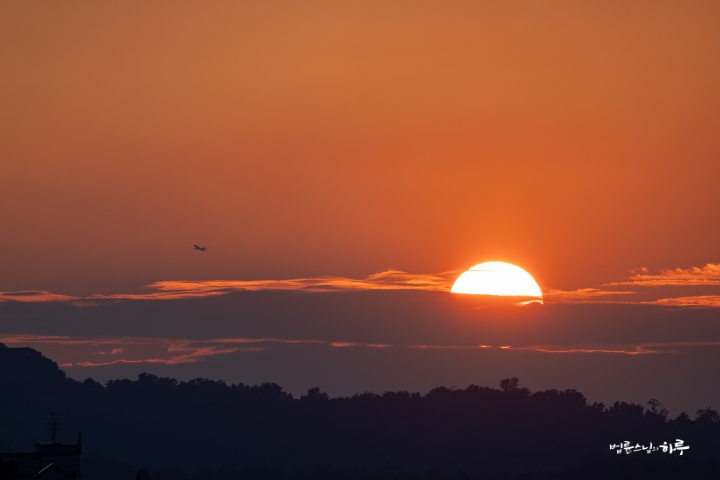
After completing morning practice and meditation, Sunim headed to the Jungto Social and Cultural Center for the Weekly Dharma Assembly.
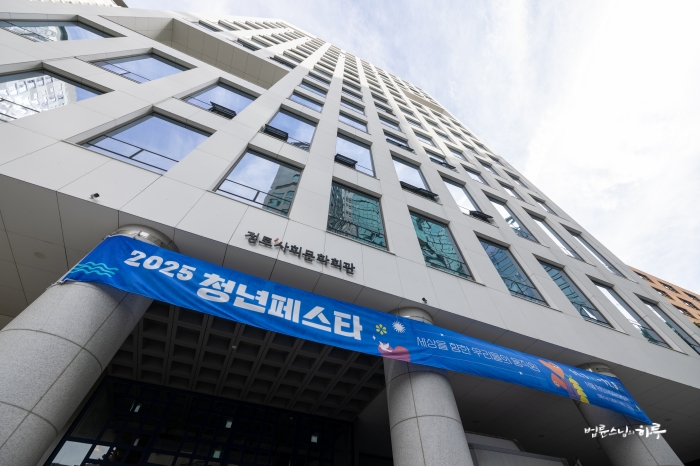
At exactly 10 AM, with about 150 members of the Sangha seated on the third floor Dharma Hall, the Weekly Dharma Assembly began with the recitation of the Three Refuges and the Heart Sutra. Jungto Society members from across the country also participated online.
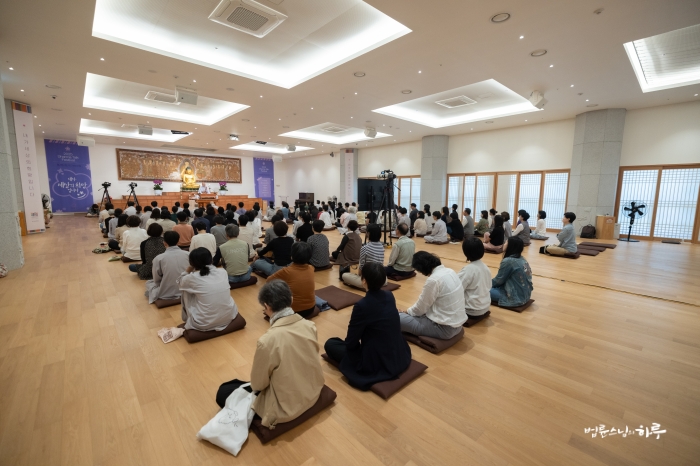
First, a video showcasing the activities of Jungto practitioners over the past week was shown. Various activities had taken place both domestically and internationally during the week, including the North American East Coast lecture tour, Youth Festa promotion, JTS welfare projects, and the EcoBuddha “Don’t Buy New Clothes” challenge.
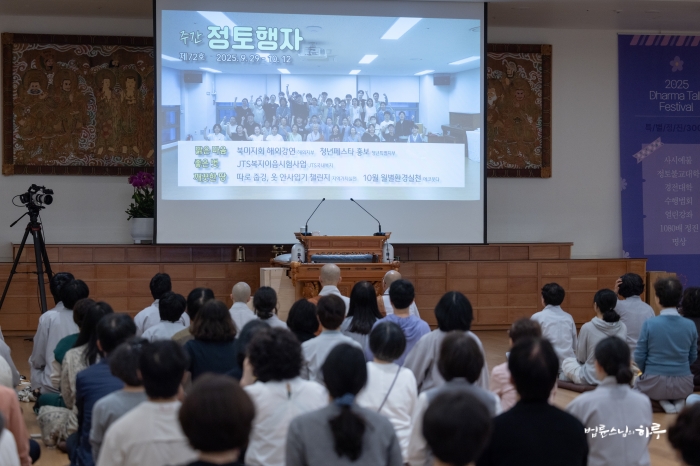
After encouraging each other’s activities with loud applause, everyone requested a Dharma talk from Sunim with three prostrations. Sunim began the Dharma talk by emphasizing that in times of confusion like now, we must let go of past frameworks of perception and look at the world with fresh eyes.
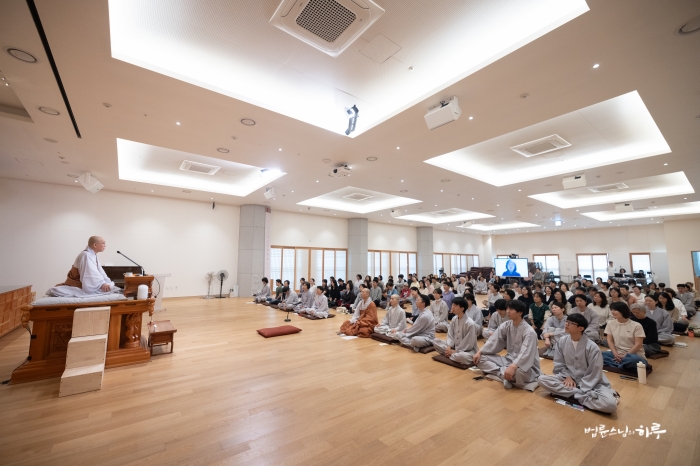
“Did you have a good Chuseok holiday? During the holiday, I stayed in Washington D.C. and completed various schedules for peace on the Korean Peninsula. I met with U.S. government officials including the State Department and Korean Peninsula experts from various research institutes to share mutual interests regarding the resumption of North Korea-U.S. dialogue and the promotion of Korea-U.S. friendship.
In Uncertain Times, How Can We Maintain Peace of Mind?
The world has always been in conflict, and today is no exception. However, looking at the current international situation and domestic politics, the nature of these conflicts seems more acute than ever. In such uncertain and chaotic times, how can we maintain our peace of mind? And what path can individuals take to contribute to world peace? I believe this is an important challenge before us today.
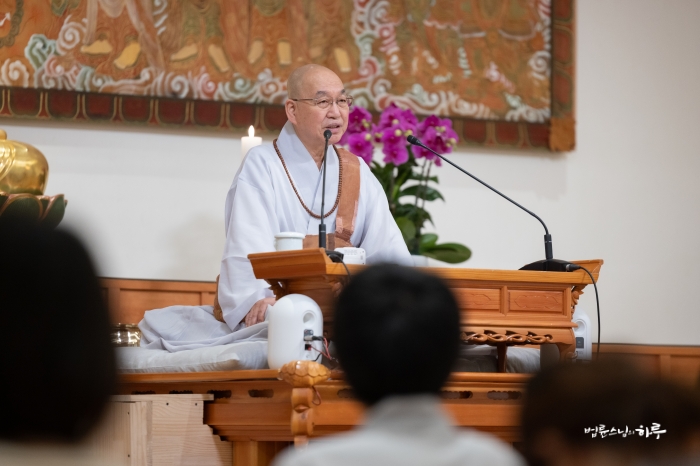
To properly understand our rapidly changing world, we must first let go of past frameworks of perception. However, since humans always view the world through frameworks already formed within themselves, changing these frameworks on our own is not easy. That’s why we often say ‘the world has become chaotic,’ but perhaps what’s chaotic is not the world but our ‘minds.’ This is because we cannot properly understand the current world with past perceptions.
If we still remain in old perspectives while hoping for stability in the world, it means the world should return to the past. However, the world never returns to the past. Therefore, we must have new frameworks of perception that allow us to see the changed reality as it is. Only then can we properly understand current changes and live while predicting future changes based on that foundation.
While there are numerous philosophies, ideologies, and religions in the world, most of them were built upon specific frameworks of perception from certain past eras. Buddhism is no exception when viewed from the perspective of religion or ideology. However, the Buddha’s original teaching is to abandon existing frameworks of perception. This can be expressed differently as ‘enlightenment.’ The Buddha said:
‘Truth cannot be verified by customs or habits transmitted from the past, by ethics or morals, by precepts or scriptures.’
Yet we still often judge right and wrong based on these standards. Now we must return to the Buddha’s original teachings. We must let go of existing frameworks such as self-centered thinking, fixed ideas formed in the past, and Korea-centric ways of thinking.
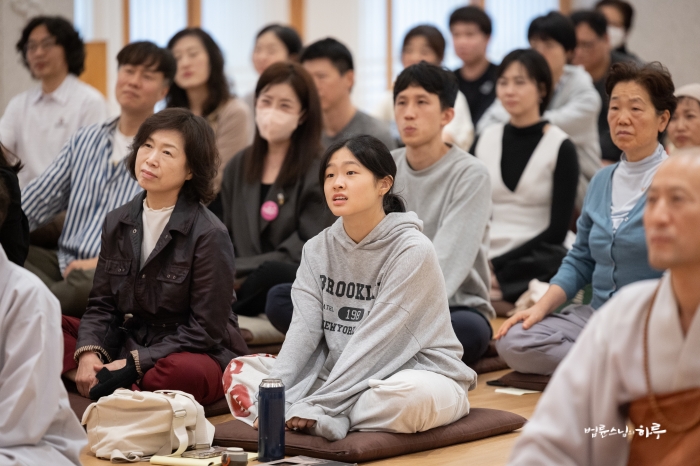
We must have a broad perspective that sees self and others together, encompasses present and past, and views Korea and neighboring countries together. If we gain new enlightenment by seeing the world as it is from such a perspective, Buddhism can present the future direction for humanity and demonstrate new leadership even in today’s chaotic and rapidly changing times.
Don’t Blame the World, Become the Master of Your Own Life
The reason I’m saying this at the beginning is because the reality of today’s world is that serious. The language and behavior used by the president of the world’s most powerful nation, the United States, is beyond imagination. It’s hard to find conscience or ethical awareness, and he unhesitatingly engages in shocking words and actions that are far removed from courtesy and dignity. But the problem is that rather than being criticized or becoming obsolete, such behavior is actually gaining more support despite people’s complaints. Both within the United States and globally. Yesterday’s newspaper featured a photo of European leaders lined up like servants of President Trump, standing at attention with their hands clasped.
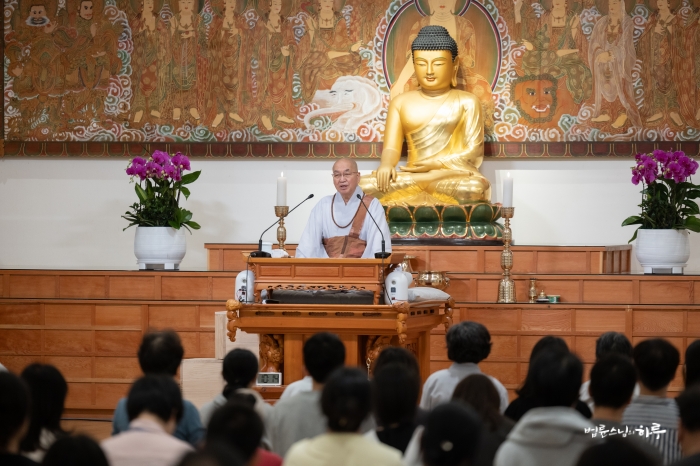
When we see such changes, what we must do first is not simply criticize or complain. We must pay attention to what these phenomena mean, to their essence. We must face the fact that ways of thinking and behaviors we couldn’t even imagine are now working in reality.
Looking at our own society, the situation is by no means light. Recently, there have been successive incidents of young Koreans being kidnapped and detained in Cambodia. Many went there to make money but were used as subordinates of criminal organizations. While the news reports them as victims, they are actually both victims and perpetrators. This is because they acted as part of voice phishing or drug trafficking organizations. What’s even more shocking is that these are not people who didn’t receive formal education, but mostly college graduates. Seeing this, we are led to ask the fundamental question: ‘What meaning does university education really have?’
Moreover, these criminal organizations had been pointed out several times in the media months ago but were neglected. Only after the tragic incident where a university student lost their life did society belatedly become noisy. However, such incidents are likely to repeat in the future.
The situation in the National Assembly is no different. Looking at the language and behavior used by members of the National Assembly, it feels like common sense has collapsed. It’s not children fighting, nor street thugs fighting, yet their words and actions bring disappointment and emptiness to the people.
Thus, both globally and domestically, it feels as if civilization is regressing. However, in the long history of humanity, such setbacks are nothing new. Human development has not been linear, and there have been times when order collapsed, like the ‘Medieval Dark Ages.’ In my view, now that we’ve entered the 21st century, this chaos is likely to intensify further. Both international and domestic situations are more likely to worsen than improve. In such situations, if individuals are also swept up in the chaos, their own lives will ultimately become unhappy.
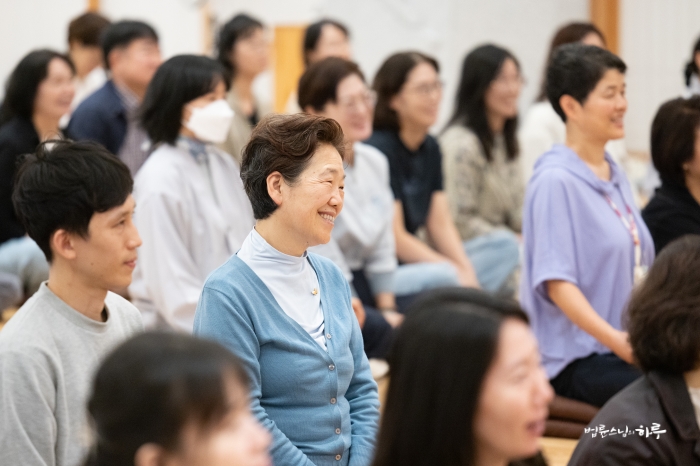
The Buddha’s teaching is clear. Don’t blame the external environment, but become the master of your own life and maintain equanimity. An attitude of ‘I do it because others do it’ is not the path of a practitioner. Saying you can’t help it because you’re swept along by the world’s current is not the proper attitude of a practitioner. Already 2,600 years ago, the Buddha said, ‘Even if the world practices class discrimination and gender discrimination, there is no discrimination within us.’ Not being dragged along by the world’s confusion and staying awakened oneself – that is practice.
Furthermore, practitioners should not stop at maintaining their own equanimity but should play a role in stabilizing the world’s chaos even a little. Not going along with the world’s current, enlightening ignorance to maintain peace of mind oneself, and comforting and helping those who suffer in confusion – that is the path of a practitioner.
Jungto Society is not a place to pray for blessings. It doesn’t aim for going to a good place after death or obtaining wealth. The founding purpose of Jungto Society is to help increase the number of people who live their lives independently and lead lives that benefit the world. When people in the world covet more jewels and possessions, Jungto Society members must know that overconsumption worsens the climate crisis and increases the suffering of the poor. We must also not forget that the food I throw away is connected to the hunger of children on the other side of the globe.
Based on this awareness, we must take the path of living frugally while maintaining dignity, sharing surplus resources, and living together. Even when people in the world fight claiming ‘I am right,’ we must acknowledge each other’s differences, understand others’ perspectives, and maintain peace. Jungto Society was created to walk this path, and we are walking that path right now.
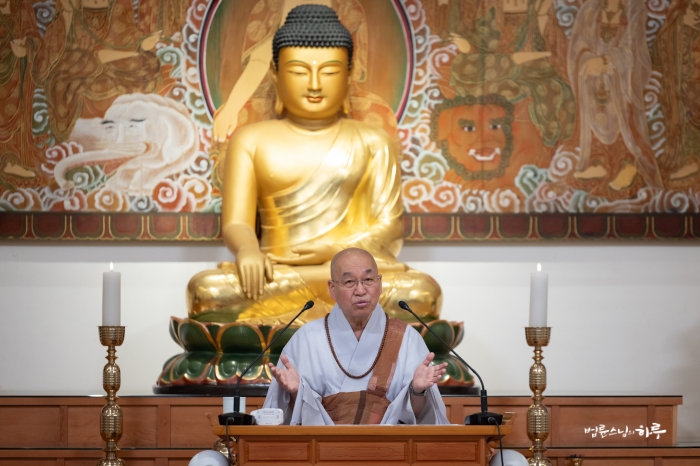
In chaotic times like now, the role of practitioners becomes even more important. Jungto Society members are beings who continue their daily practice and implement small but meaningful actions in the world. Living as a practitioner means maintaining one’s dignity personally and becoming a precious being socially.
Especially these two weeks are the semi-annual retreat period for Jungto practitioners. It’s a time to pray together for personal practice and world peace. So this week, please focus a bit more on your own practice. Put your mind on being fully aware of yourself, don’t waste energy on tormenting yourself, and please practice service and giving that looks after your surroundings and benefits the world.”
Next, those who had pre-registered questions took turns asking them. Two people asked questions in person and one online, each having a conversation with Sunim. One of them sought Sunim’s advice on how to recover after their daily life and mental state had completely collapsed due to chronic pain following a traffic accident.
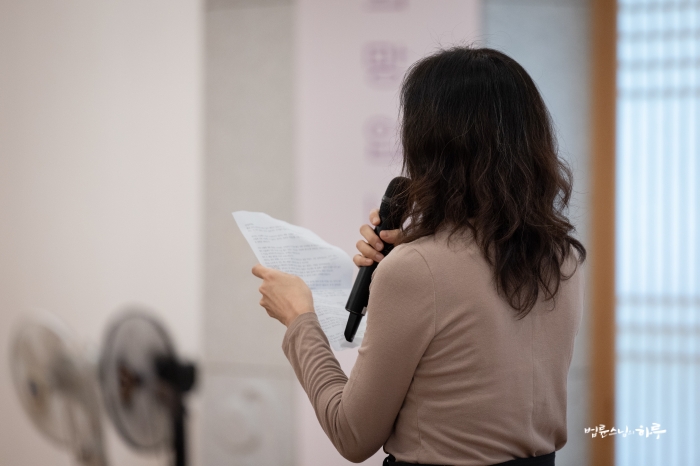
How Can I Live Without Depending on Medication?
“What specifically do you mean by ‘escaping from this situation’?”
“Living dependent on medication makes daily life difficult, and I can’t practice diligently. I want to escape from this situation.”
“So does escaping from this situation mean getting better from your illness? Or does it mean not taking medication?”
“I want to escape from a life dependent on medication.”
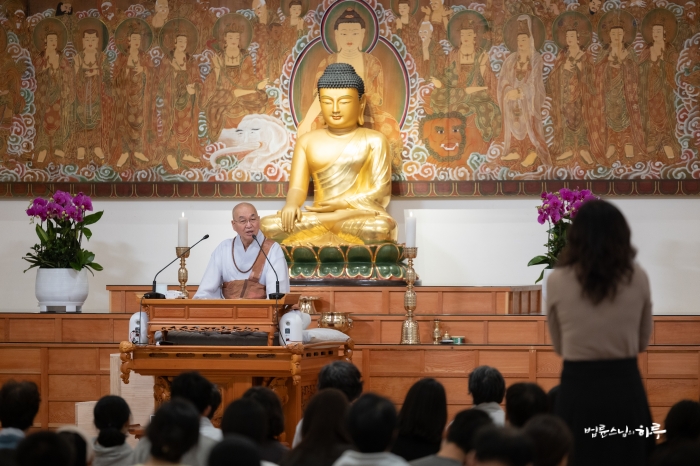
“Then just don’t take the medication. If you don’t want to depend on medication, just don’t take it. But if you have brain damage and chronic pain right now, don’t you need to take medication? You need medication to alleviate the pain, don’t you? If you’re okay without taking it, you can try not taking it. But if you try not taking it and the pain is too severe, then isn’t that a situation where you need to take medication?”
“When I go to get my medication, the doctor always says it’s just psychological factors. He says there’s nothing wrong, but I don’t think that’s true.”
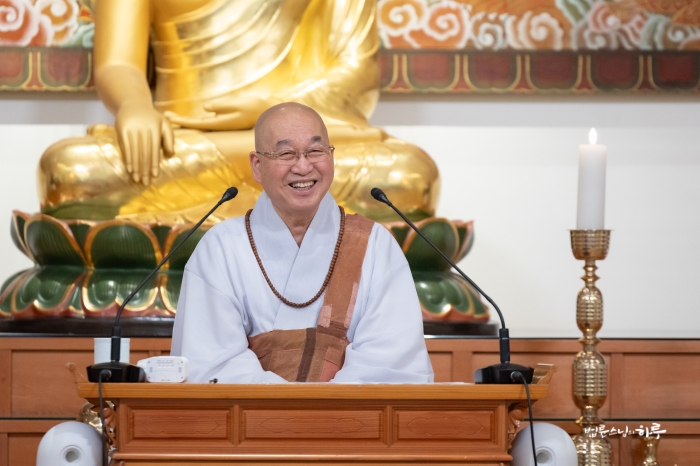
“That’s because you keep asking, ‘Can I not take medication?’ That feeling of ‘not wanting to take medication’ is what he means by psychological factors. If it were really just a psychological problem, why would the doctor give you medication? A doctor would say, ‘It’s a psychological problem, so you don’t need to take medication.’ But the doctor is giving you medication, isn’t he? Because you keep saying, ‘Can’t I live without taking medication? Can’t I be free from medication?’ he’s calling that a psychological factor. So take the medication the hospital gives you regularly and live your life.
And although you were seriously injured in a traffic accident, isn’t it fortunate that you’re alive and not dead? Of course, it’s difficult to work in your current condition. How could you even go to work in this state? But were all your medical expenses covered by insurance?”
“Yes.”
“Then how are you managing living expenses?”
“I’m living as a basic livelihood recipient.”
“Then that’s fine. Just live as a basic livelihood recipient and take your medication properly. How can you work when your body isn’t well? Just live like that. Even Jungto Society staff members will all become basic livelihood recipients when they get old. Since practitioners don’t own anything, they can all be considered basic livelihood recipients. Being a basic livelihood recipient is wonderful. When you turn 65, you also get the basic old-age pension.
You can’t work now because of the traffic accident, but thanks to that, you’ve become a basic livelihood recipient. Among Jungto Dharma Teachers, there’s someone who can’t work due to a traffic accident, but they think, ‘It’s fortunate just to be alive and not dead.’ So whenever I see that person, I say, ‘Don’t think about anything else. Just being alive is a joy to me.’
If you change your perspective like this, whether you live for one year or ten years, whether you’re missing an arm or a leg, whether you can’t see, anyone can live happily. If a blind person must be able to see again, if someone with an injured leg must completely heal and walk, that’s impossible. Having such desires makes your life feel miserable. But if you think, ‘It’s fortunate just to be alive and not dead,’ then your life becomes blessed. If you only wish for your body to return to normal, the traffic accident will only feel like a disaster. The traffic accident was a disaster, but within it, the fact that you’re alive and not dead is a blessing.
If you accept being alive as a blessing, you can be happy even now. But if you use the time before the accident as your standard, you’ll always feel unhappy. We don’t know how long we’ll live, but while we’re alive, would it be better to live happily or unhappily?”
“It’s better to live happily.”
“To live happily, you need to recognize that being alive is a blessing. What can you do about something that has already happened? At least there’s medication, so you can live without pain. So why is medication a problem? Medication is good. Without medication, I wouldn’t be able to give Dharma talks because of pain, but because there’s medication, I can take it, give Dharma talks, and walk around. So why is medication bad?”
“My self-esteem drops every time I take medication.”
“That’s exactly what the doctor meant by psychological problems. Why does your self-esteem drop when you take medication? By that logic, my self-esteem drops every time I eat. (Laughter) The reason the doctor says it’s a psychological problem is because you keep saying, ‘Isn’t there a way to not take medication? My self-esteem drops every time I take medication.’ Taking medication doesn’t cause your self-esteem to drop.”
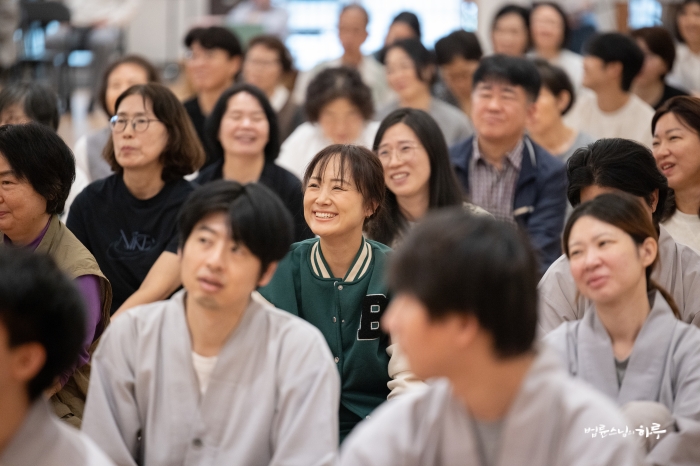
“Listening to Sunim’s words gives me strength. Thank you.”
True Happiness Begins When We Accept Things as They Are
“When people get old, they wish they were young. When they’re injured in an accident, they wish to return to their pre-accident state. But if they’re currently young and uninjured, are they satisfied with that state? No, they’re not. They get plastic surgery because they want rounder eyes, shave their jaw because they don’t like it, raise their nose, and insert implants to make their chest fuller. People with children say, ‘I wish they’d grow up faster,’ and people without children say, ‘I wish I had children.’ These desires are endless.
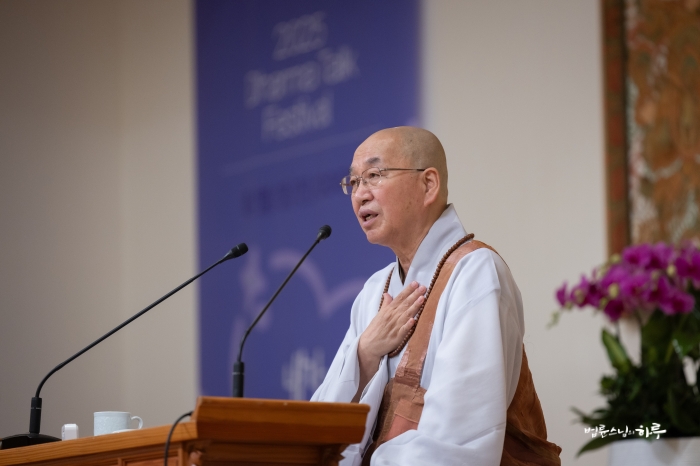
Practice means knowing that yesterday was good as yesterday, and today is good as today. When you’re young, it’s good to be young, and when you’re old, it’s good in its own way. I really like getting older. When people are students, it’s hard studying and taking tests every day, but later on, there’s no need to study. When married, people are busy raising children, but not everyone has that, and there’s no obligation to go to work. When riding the bus, seats are reserved for the elderly, and the subway is free. After 65, pension benefits begin. So why is getting old bad?”
Hair colors – yellow, black, white – they’re all just different. So why do we think white hair is bad? People deliberately dye their black hair blonde, but when they get older and their hair turns white, they want to dye it black again. It’s all just attachment. Practice means accepting an injured leg as it is, and if you can’t walk, you use a wheelchair. The elderly ladies in the countryside where I stay are much faster than me. They zoom past on electric carts, and even those who have difficulty walking because their backs are bent carry more loads than I do. They attach handcarts to the back of their electric carts and drive on the roads loaded with goods.
And what about when eating? If there’s meat in the food, people complain it’s bad for health, and with vegetarian meals, they complain there’s no meat. This is why suffering is endless.
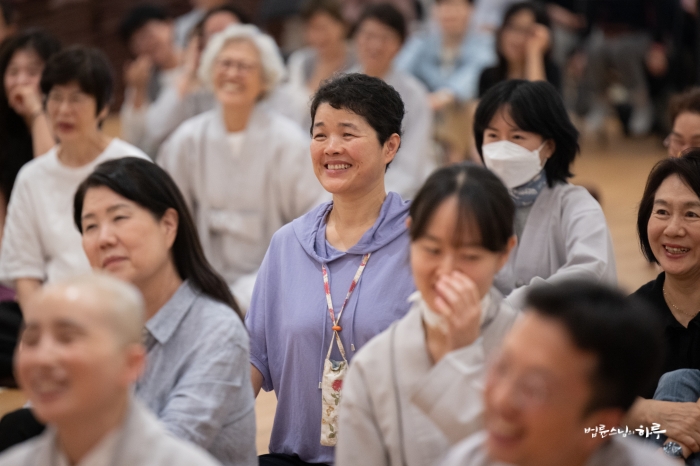
I didn’t deliberately make my legs unusable. If my legs don’t work, I have no choice but to live accordingly. I can’t climb high mountains anymore either. I can’t do long hikes. I’m someone who’s climbed every mountain since I came of age, but if I cling to those times, I become unhappy. Now I’m grateful if I can walk on flat ground, and if I can’t walk on flat ground, I’m grateful just to be able to sit, and if I can’t sit, I should consider it fortunate just to be alive. That’s how you make every moment of your life happy. This is the way to care for yourself.
You were injured in a traffic accident, so what can you do now? If you need to take medication but refuse to, that’s just being stubborn. You should take it gratefully, thinking, ‘Thanks to this medication, I can live without pain.’ It’s good to change your perspective and think every time you take medication, ‘You are my life.'”
“Yes, thank you.”
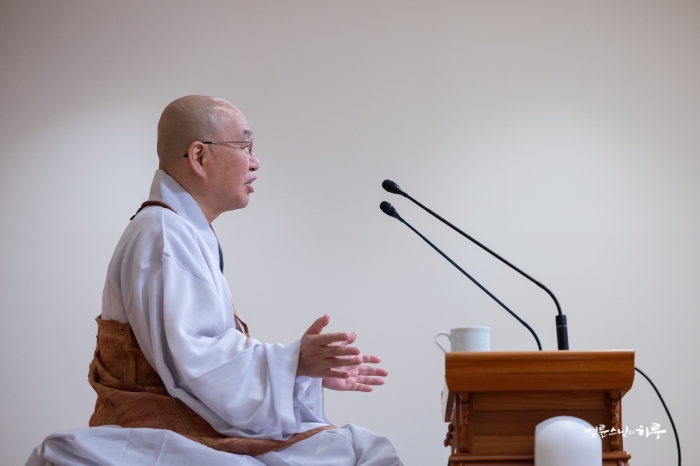
“In the past, many people couldn’t study even though they wanted to because of poverty. How envious they must have been of friends who could study. When you can study, it’s good that you can study, and when you can work, it’s good that you can work. But people who’ve lost their jobs envy those with jobs, unmarried people envy married people, childless people envy those with children – it’s endless. A practitioner is someone who is grateful for what they’re given, finds satisfaction within those conditions, and lives a life that helps others even a little. That’s why in Jungto Society, we consider it important to maintain our dignity by volunteering in small ways even as we age, until our last breath. Taking medication doesn’t compromise your dignity. You may have some physical discomfort, but you understand things well. Some people have perfectly healthy bodies but can’t understand what’s being said and live mindlessly. The body isn’t the big issue – the mind is more important.
In life, you might injure your hand, your leg, or your head. Your wealth might disappear overnight. In such times, you should be grateful just for being alive. This doesn’t mean you shouldn’t do anything. Based on gratitude, you first need to know how to be satisfied with your life. You need to have the perspective of ‘If I can do it, I will; if not, that’s fine too.’ Then each day becomes comfortable, and you can live happily under any conditions.”
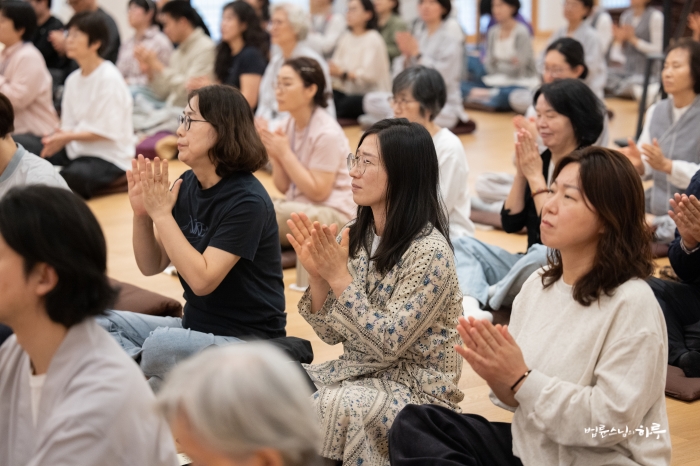
Questions continued to follow.
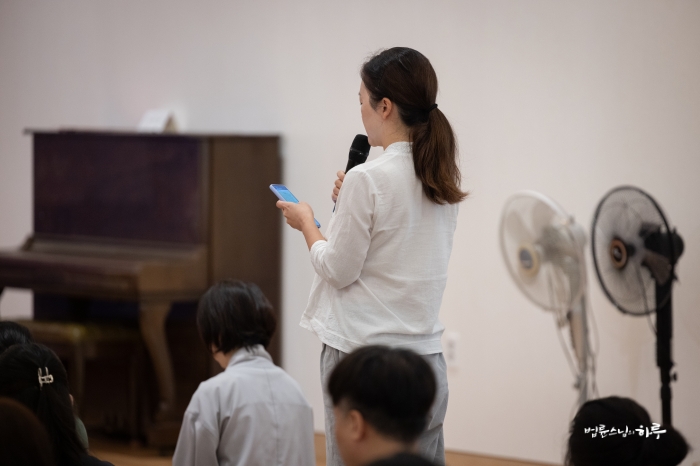
My 20-year-old daughter hasn’t spoken to me since February last year. I’m okay because I volunteer, listen to Dharma talks, and have encountered Buddha’s teachings, but I feel sorry that my daughter seems to be suffering because of me. What should I do?
My parents are curious about my salary and tell me to give my paycheck to my mother and receive an allowance from her, which feels like interference, so I’ve been avoiding answering.
While answering questions, it was time to end the Dharma assembly. They agreed to continue the conversation at next week’s Weekly Dharma Assembly, and the assembly concluded at 11:30 AM.
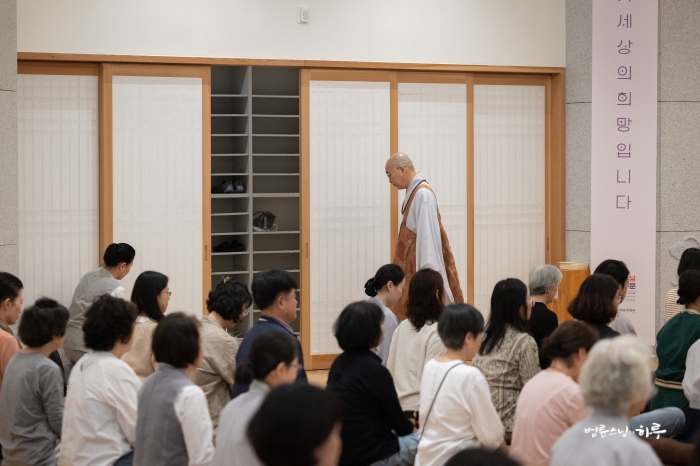
After leaving the Dharma Hall on the third floor, Sunim welcomed a visitor to the Peace Foundation. He met with Democratic Party National Assembly member Kim Byung-joo, had lunch together, and shared tea and conversation. They discussed many topics regarding crisis management strategies in the security field.
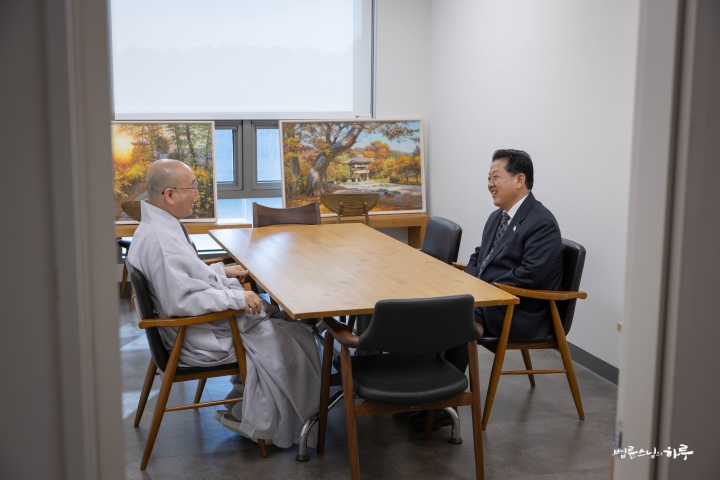
At 2 PM, Choi Yeol, Chairman of the Green Foundation, and Kim Dong-sun, Vice President of Hanwha Galleria, visited Sunim for a meeting. This was their first meeting in four months since the Green Foundation and Hanwha Galleria jointly hosted a Green Talk Concert with Venerable Pomnyun Sunim last June.
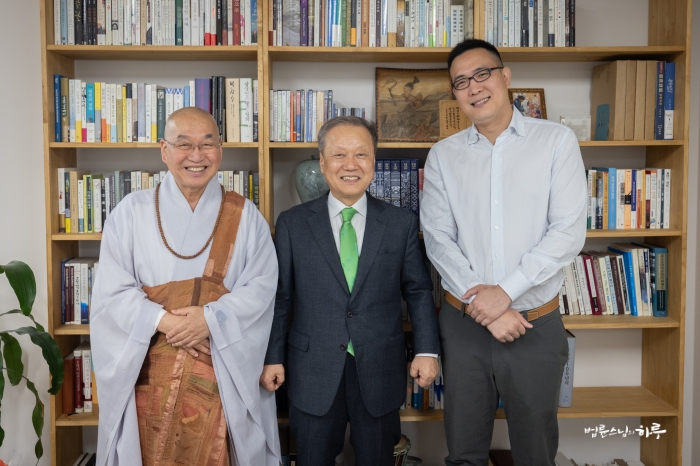
After discussing the need for cooperation between government, business, and civil society to overcome the climate crisis, they took a commemorative photo together and concluded the meeting.
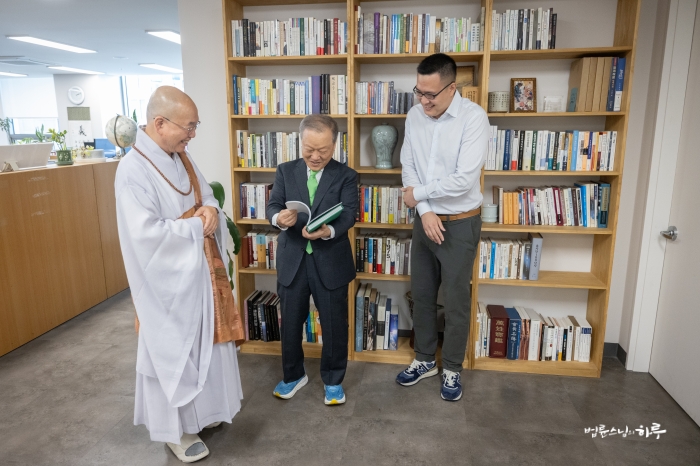
After seeing off the guests, Sunim immediately headed to Dubuk Jungto Retreat Center. Departing from Seoul at 4 PM and driving on the highway for 3 hours and 30 minutes, he arrived at Dubuk Jungto Retreat Center at 7:30 PM.
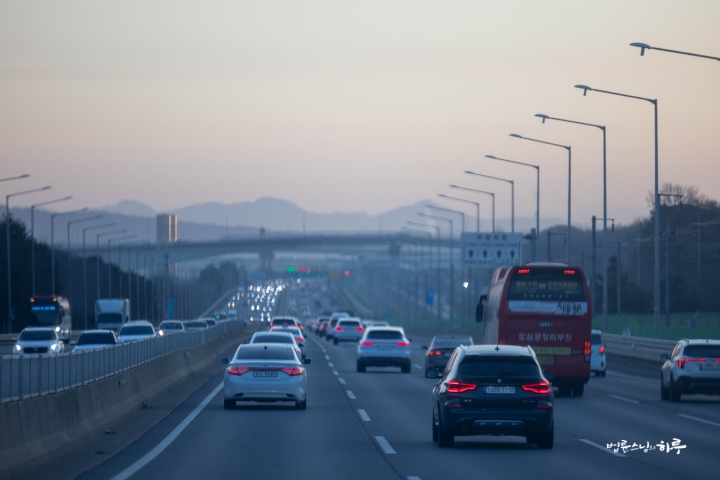
After sunset, in the evening, he worked on manuscript proofreading and various other tasks before concluding the day’s activities.
Tomorrow, he will attend the Peace 2.0 Forum at Kyungpook National University in Daegu on the theme of “Peace on the Korean Peninsula and the K-Initiative,” then move to Ulsan for a Dharma Q&A lecture invited by the Ulsan Lions Club.





